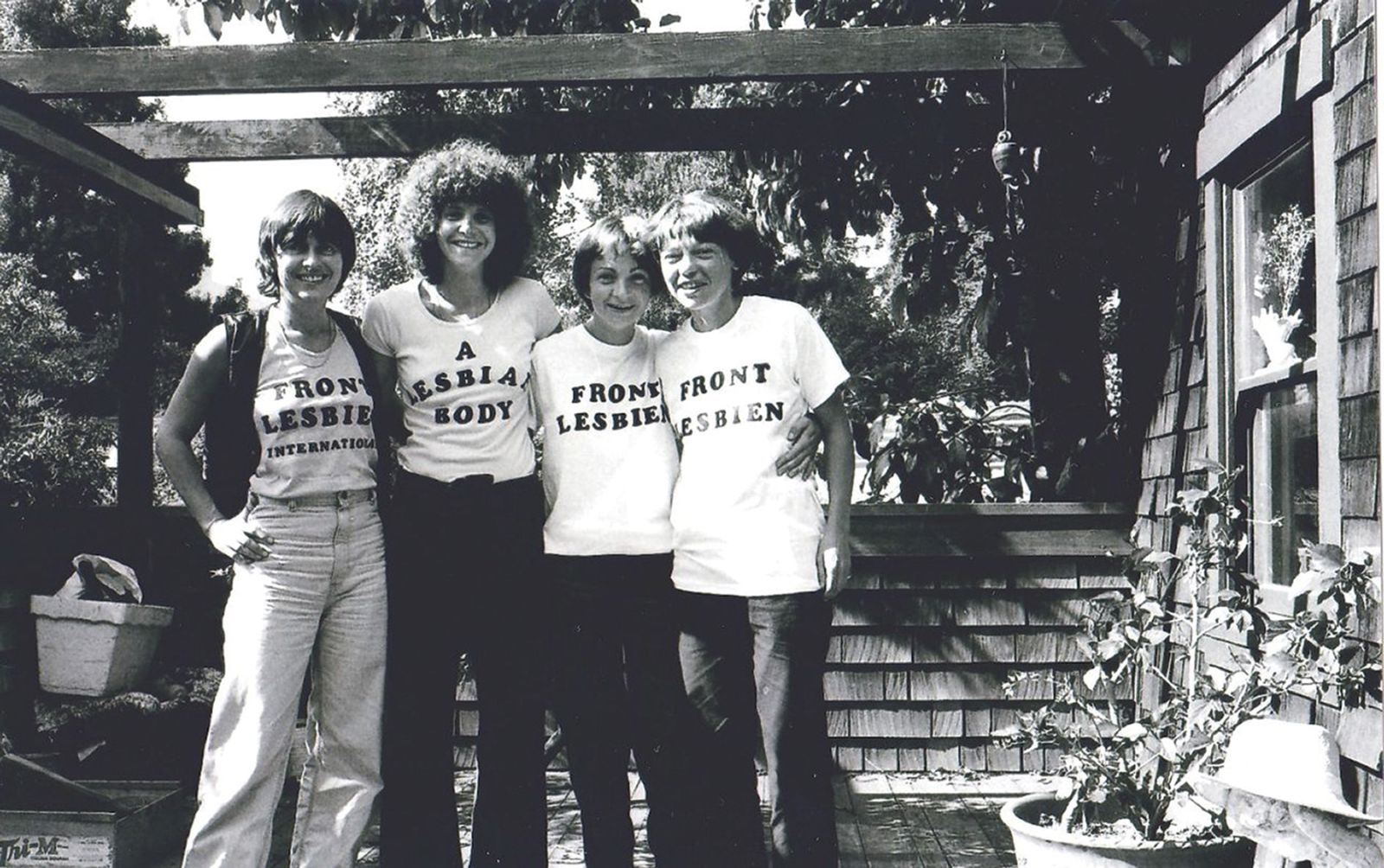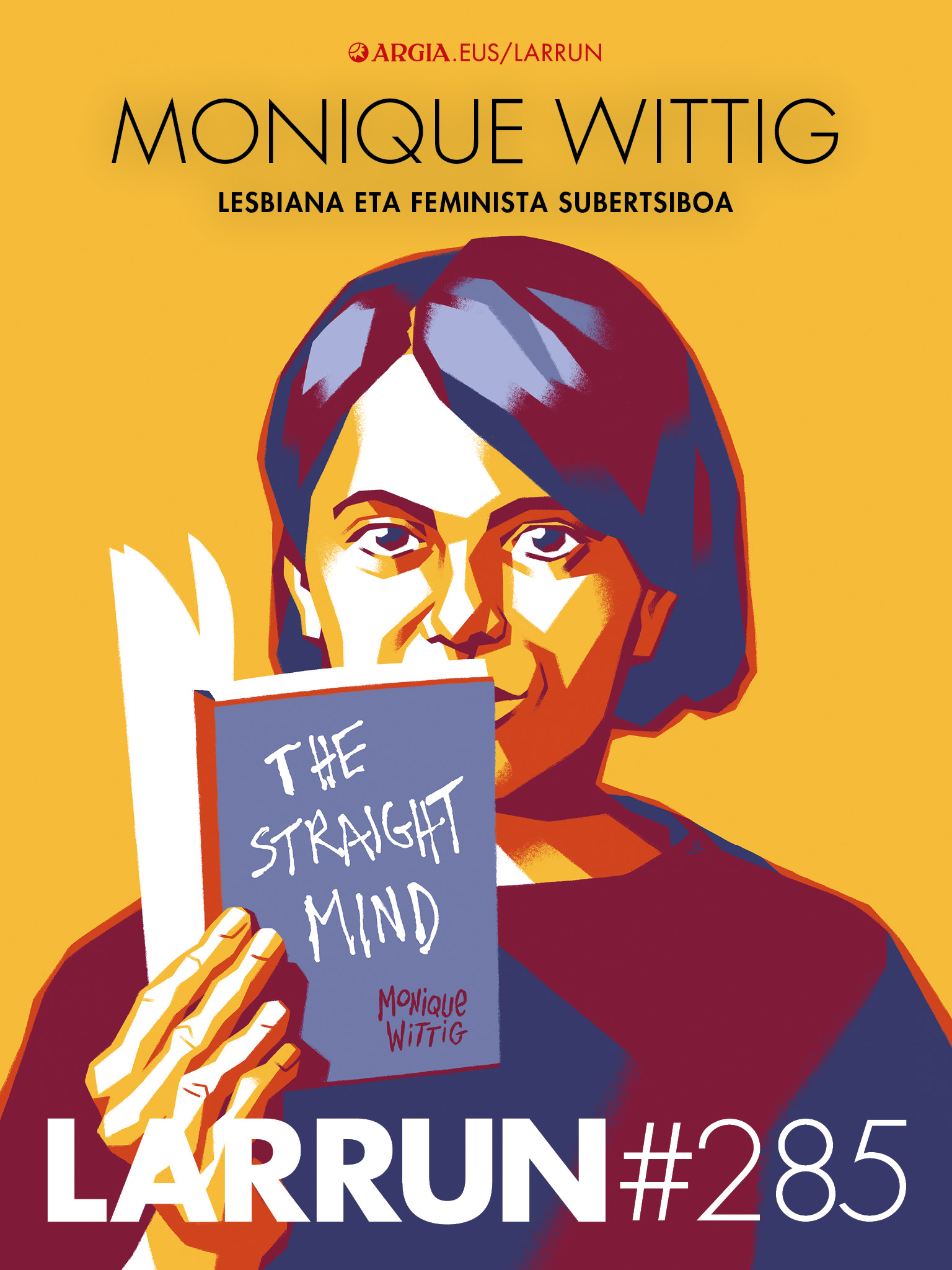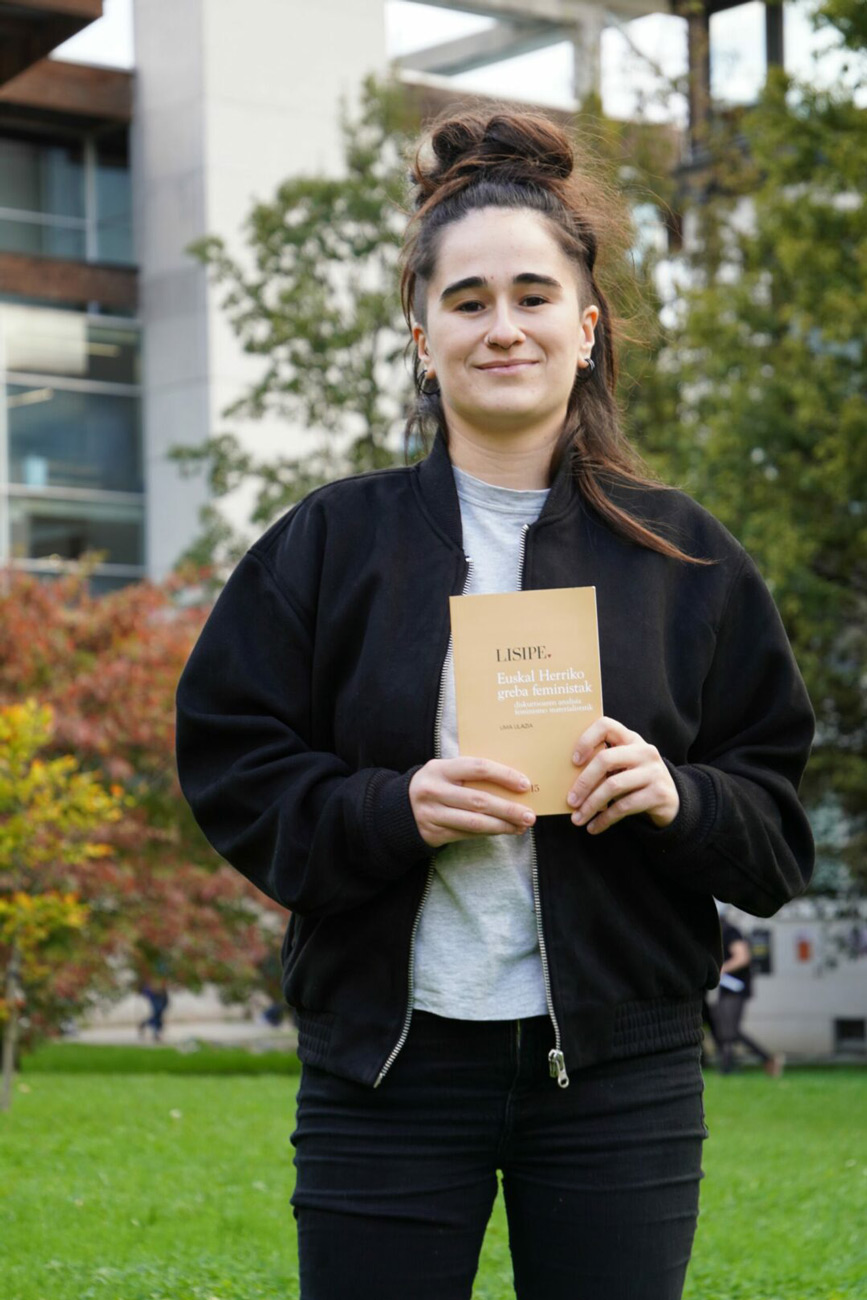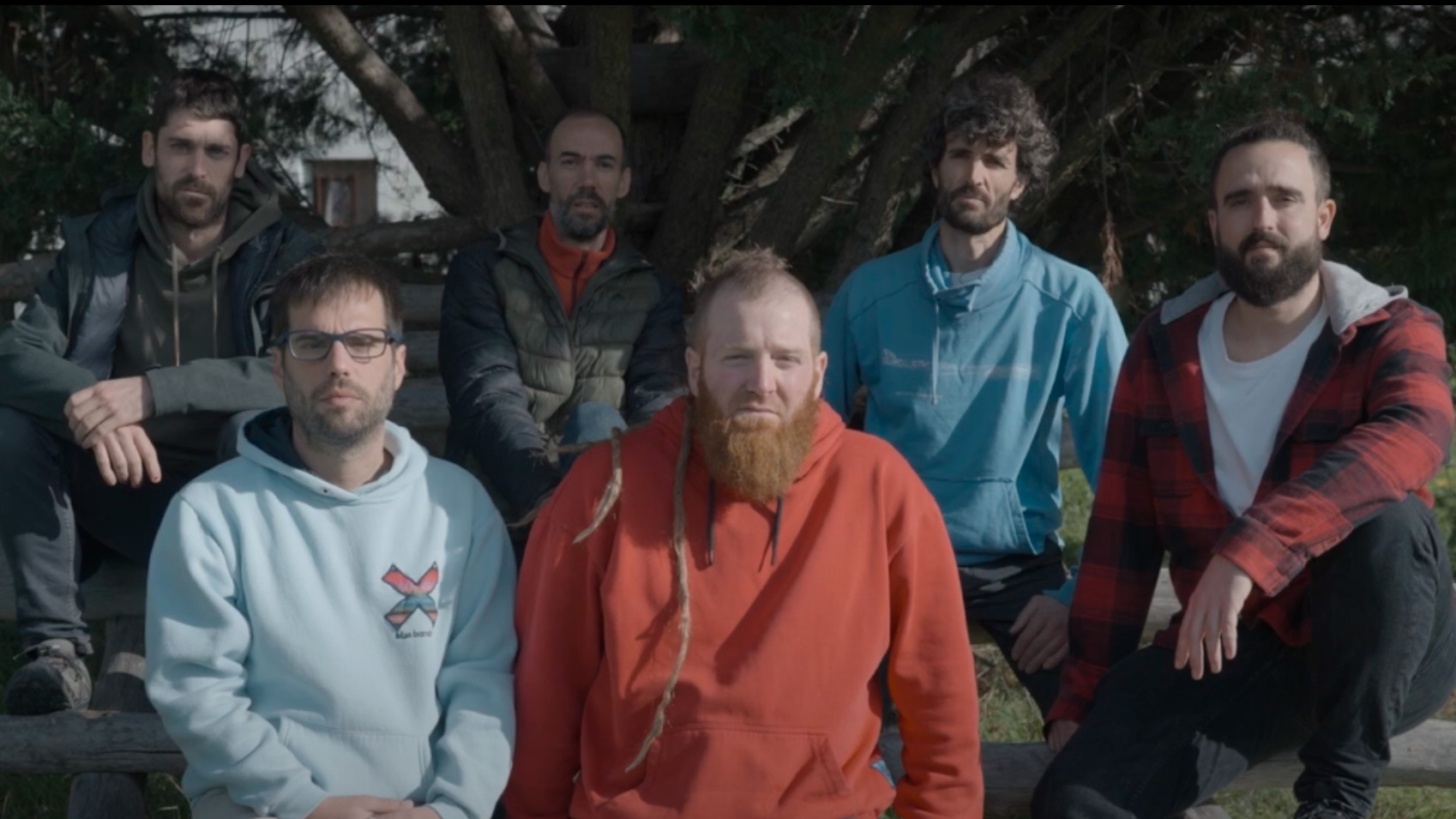Precursor of feminism without subject 'Emakume'
- Monique Wittig said in 1978 that "the woman is not created", assuming the phrase "the woman is not created, is made" of Simone de Beauvoi, who revolutionized the corners 30 years earlier. When society had not yet planned the affirmation of gender construction, it took one step forward: sexual categories are also constructions. Straight Mind is one of the theorizers of the political concept. He died 20 years ago, on 3 January, a victim of a heart attack. Two decades later came the statements, the acknowledgements and the considerations that he did not receive. Alive, because it caused many bridges and walls, the hardest had feminist friends, who represented them as subjects of revolution. Time has given him reason, or it has taken a long time to accommodate the idea of sexual construction. Her proposals, silenced or insulted, have been advanced by directing feminist theories and opening the way to queer thinking developed in the 1990s. Monique Wittigen's thought is more alive than ever. We've targeted LARRUN to make more known what's too unknown.

Monique Wittig (1935-2003). Lesbian and feminist. Radical lesbian and feminist materialist; materialist lesbian and radical feminist. Thinker and writer; writer and thinker. But the journalist who reflects on the skeleton of the LARRUN that you have in your hands knows nothing to start with the explanations of the revolutionary reflections of the thinker or with the presentations of his cave contributions in the literature. In the end, there will be displacements because they carried the two by hand, because fiction was also a tool to capture their political reflection. He said he had literature as a "war machine." Its battle is the destruction of sexual categories and hence the disappearance of heteronorma, "heterosocialization". Aware of the power of words, he guided writing from this position: "Language does not reflect reality, violently forgive reality and materializes it".
"Lesbians are not women"
"Lesbians are not women" is probably the clearest phrase that can summarize Wittig's thoughts and actions. In 1978 he opened it at the The Straight Mind Conference, held at Barnard College in New York, and brought it to France, through the magazine Questions féministes, four years in advance, under the title La Pensée Straight. Pulling this talk that would complete one of his best-known books: The Straight Mind (1992) [What we can also read in Basque: Heterogeneous thinking (Susa, 2017)]. Wittig states that lesbians are not women because their specific social relationship with a man guarantees the category of "woman". Thus, "getting rid of" heterosexuality, her thought has focused on lesbians destroying the female category.
Reader, recalls that when she publishes lesbian Le corps, homosexuality is not only included in the list of mental illnesses, but
is
legally a crime in the French state
I did not accept the distinction between gender and sex, because that means that we have social, built and cultural sex – gender – which must be desired, and a natural and biological reality – sex. This naturalization has been refuted through scientific and fictitious writings, since the association of sexual categories to anatomy assumes a naturalization of differentiation, hierarchization and repression between men and women. Obviously, the multiple ones that exist in the reproductive system do not question it, but ultimately this part of the body should be as careful as focusing on the digestive system. Basically, it doesn't have everything and condition.
Hence, he claimed the need to politicize heterosexuality, placing it as a political system in which the male class oppresses the female. That is, heterosexuality is not just a personal desire: "There is no sex. If sex is oppressed and oppressive. Oppression is sex, it is not the opposite", we can read in the heterogeneous Thought. Lesbians guided the position that women are not women from there, considering them as a solution to live free from this class oppression. In the same sense, adapting the famous phrase of Questions féministes, Simone de Beauvoi, "the woman is not created, is made" to the same phrase: "The woman is not created" and point.

Reader, remember that we are in 1980. Beauvoi's phrase, translated by mentality, is only 30 years old and still has a long way to go: sociological, economic, political and cultural organization is oriented towards a gender based binarism, and has a great influence on oneself and social relations. In addition, in the French State homosexuality is still included in the list of mental illnesses, and is also legally considered a crime. On 12 June 1981 it was removed from the list of diseases and that same year the "pederant-lists" of police prefectures in which gays and lesbians were marked would disappear. On 4 August 1982 the government of the socialist lehendakari François Mitterrand abolished the crime of homosexuality. In this context we can truly imagine the misunderstandings and anger caused by Wittig’s analyses and proposals.
Since it could not be otherwise, it is so easy for us to imagine the surprise, the strength, the indication and the salvation that the lesbian Le corps book ("The Lesbian Body") published in 1973 would entail. In his publication, he pointed out that "I wanted to write a book that was totally lesbian in theme, vocabulary and texture; from the beginning of the lesbian book to the head, from the surface to the back page". In the book we cause the rewriting of the body and sexuality, far from words, points of view, anatomy and disturbances modeled by forced heterosexuality.
“There is no sex.
If sex is oppressed and oppressive.
Oppression is sex, not the reverse”
(Wittig, The Straight Mind)
Here is a passage from the book Heterogeneous Thought, to pick up his point of view from his own words: "When I know, lesbian is the only concept that is beyond the sexual categories (woman and man), since the designated person (lesbian) is not a woman, economic, political, or ideological. What a woman does is a specific social relationship with a man, a relationship we have called servitude; a relationship that involves not only personal and physical obligations, but also economic obligations (the "forced domicile", domestic tasks, marriage duties, children without limits, etc.). Lesbians, refusing to become or remain heterosexual, escape from that relationship. We are deserters of our class, like the American slaves who were fleeing and freed from slavery. For women this is an absolute necessity, and in order to endure we have to end the female class with all our strength, with which men are aware of women. To achieve this, it is essential to end heterosexuality as a social system in which men oppress women; to justify this oppression as a system that generates the doctrine of inequality between the sexes".
At the base of materialistic feminism
It had a materialistic view and is the basis of the materialistic feminism flourished in the French state. Along with Wittig, we cannot but mention Christine Delphy, Nicole-Claude Mathieu, Colette Guillaumin, Paola Tabet, Monique Plaza and Emmanuèle de Lesseps, all theorizers of this approach. We can find your reflections in the files of Questions Féministes magazine. The day after May 68, the Marxist perspective had spread throughout the various social movements in Paris, from where they also looked at the oppression and liberation of women.

The article Théories matérialistes du genre ("Materialist theories of the genre"), written by Elèonore Lipenard and Marylène Liebern, helps us to identify in more detail the lines of this thought. It is defined as: "Breaking with Marxist orthodoxy (according to which in the end of capitalism we end all kinds of oppression, including that experienced by women), the Marxist and materialistic feminist approach of the 1970s considers patriarchy as a system of total oppression. Capitalism and patriarchy are at the core of social organisations that harm the female class and in order to cope with it, one cannot criticise only the productive sector (labour). This approach guides their reading from the axis of relations: men and women are considered as classes, making analogy with the bourgeois and the proletarians".
“Wittig offers us something else: an oblique
lesbian, political and literary reading. The one that goes against the direction of the wind, showing its back to the norms and
customs” Emilie Noteris
From these two locations, lesbian by the subject and materialist feminism, spoke in the assemblies of the recently constituted Movement for the Liberation of Women (Mouvement de Libération des Femmes) MLF in Paris. The creation of the MLF would have occurred in May 1968, as in the collectives of this revolutionary leftist phenomenon there was no priority to fight for the oppression suffered by being a woman.
The MLF, founded in 1970, was the main driving force behind the feminist movement in France. In the streets of Paris, thousands of women were gathered, following the assemblies of the amphitheaters of the University of Sorbonne, and, of course, feminism extended beyond Paris – the feminist movement of Iparralde cannot be understood without this group. But it cannot just be praised. If black and white photographs that give us envy and pride to feminists reflected arguments, disagreements and tumultuous disagreements between them, eye pain would be affected.
Fleeing the United States, seeking space for reflection
Regarding the discrepancies within the MLF, Wittig's reading was one of the main thorns, as it questioned the subject of the feminist movement, the woman. The majority heterosexual feminists did not have an open attitude to look for it. In general, there was no room for lesbian experiences, looks and reflections. They were white, heterosexual and upper-middle-class women in most cases, and the realities that transcend their position were in confrontation to integrate into the struggle.
The other great debate between the materialists and those of the Psychanalise et politique group, better known by the abbreviation psychépo. The latter, led by the old Antoinette Fouque, from differentialism, from essentialism, followed the objective of forming a female subject different from the patriarchal law that claimed inequality between the sexes. As could not be otherwise, with the reading of Wittig, who defended the end of the sexual category, the shock was total.

They had no place as lesbians, neither in the feminist movement, nor in gay gay groups. Thus, they began to organize among themselves. Les Gouines Rouges -"Bolleras Rojas" - was founded by about 50 chapels in the summer of 1971 – the name comes from the recovery of an insult, when in a demonstration the newspaper Le torchon brûle of the MLF, seen by a man walking and looking! Red boots!" If you had jumped the note. Wittig was a very involved group, but neither had the passion that he hoped and disappeared three years later.
MLF was deactivated at the end of the 1970s and Wittig personally decided to move from PARIS and France to the USA.
With the tensions overflowing, the MLF was disabled between eight and nine years. Wittig personally decided to move from Paris and France. The attitude of heterosexual feminists and the Psychepo group was violent and did not stand the obstacle. We can read in a letter addressed to the famous lesbian poet and theorizer Adrienne Rich: "Dear Adrienne, I wanted to flee the political life of Paris when I arrived in the United States. I was torn apart. (…) These seven years have been like a journey to hell (1968-1975)." In 1976 he left Paris and his world to defend himself and be able to take the step of his theory. He cites the pains and barriers suffered in the book Paris-la-politique ("Paris-politik-a"), which lists stories written between 1963 and 1985. It was published in 1999 and said to journalist Claire Devarrieux, “A parable allows you to mark the distance. In every political group, however, we always have the same functioning: we do not attack the enemy, but the closest, and that does damage, it can kill him. There's a parable [in the book] of this and what this can affect people. Every time I've gotten into this political substance, I've gotten into my dreams, I've met the guillotine, the head cut. It's been Russian."
Sande Zeig settled with his lover in the United States, where they would do their life collecting, unlike France, a space for their thought. "With the intention of constructing a lesbian utopia, literally, conceptually," a book was formed a few months ago written by four hands on holidays on the Greek coast: Brouillon pour dictionnaire des lovers ["Draft for a dictionary of lovers"]. They fed the play with a few books, Sir James George Frazier's The Golden Bough, Helen Diner's Mothers and Amazons, Safo's poems and the Bible. If the writing phase was joyful, the result was different. Instead of publishing it under the name of the two, the publisher Grasset wanted to publish it on behalf of Monique Wittig, and the back of the book they wanted was printed with non-compliant text. They wrote to the publisher, "MW hasn't just written this book. For us, the Amazon is not part of mythology. Lesbian's imaginary world is not invariable. If it was for the celebration of body parts, books have been trapped. MW is not only the author of L'Opoponax, but also of Les Guerrillères and Le Corps lesbies. We reject the term ‘feminine literature’.
“Publishing more books written by women at the time does not mean that the situation had changed: literary criticism remained reactionary and masculinist”
Wittigen's thought revolutionized everything and hardly echoed it. Although they received space for dissemination, the editors were not completely correct. Although not in bad faith, Wittig went along with many elements oriented by political choice, because in the end they read of heteronormative thought.
Spreading the political proposal from fiction
By analyzing their fictional books, we can collect their goals and their laughs. The author of the book Wittig, Emilie Noteris, says it was “a constant mixture of gender”. That is why the tendency to link literary creation and political proposal to what happened in the US does not seem appropriate. He stresses that "the political challenge [Wittigen] is not to distinguish between theoretical and literary, he has worked in his work in a bold and funny way. His idea is to be clear that the writing style and the form of the text have as much value as what it brings at the philosophical level."
In his opinion, it is also necessary to place Wittig’s work within the movement called ‘Berria Novel’: “Those writers who switched from tradition to the ‘fingers of chariots’, following the figure of Claude Simon. I really like that image of moving from the main road to the edges of history. They wanted to move away from the development of character psychology, from well-worked intrigue, from the end and from other comfy ways. The desire to move away from the normative and standardized character of literature. I want to move away from marked reading trajectories. Wittig offers us something else: a lesbian, political and literary reading in oblique. It goes against the direction of the wind, showing its back to norms and customs".

Both the term "female writing" and "female writing" considered them fraudulent because they were considered as a means of ratification by the oppressed class of women. He said, "There's no female literature, there's no literature. In the literature, I do not separate women from men. You're a writer or not. In this mental space, sex is not determinant. We have to have an area of freedom. Language allows it. The road is to build a neutral escape from the sexual category." In 2010, Chantier littéraire ("Literary Xantier") published his reflection on literature and language.
The denominations ‘female writing’ and ‘female writing’ were considered fraudulent by Wittig as a means of ratifying the repressive class of women.
Among the political and literary strategies he uses, the use of pronouns stands out: "All the themes and materials in my books are personal and impersonal pronouns. Through these words, gender is established and controlled in language, but in the same way, the use of [gender] can be questioned and even nullified among them".
At only 29 years old, his first L´Opoponax novel in 1964 brought him the famous Medicis prize. Starring a few kids, especially a tiny girl named Catherine Legrand. We discover the reflections of boys and girls, we feel in their language and vocabulary the advance of time/age. The literary critiques of the time highlighted the love relationship that exists in the book. The author himself warned in an interview: "There is a love story of two girls ttip (…), but this part of lesbianism has been tacit." The choice of pronoun on this work explained it as follows: "Thanks to this pronoun with no gender and no quantity, I could be informed of the characteristics that I could give, placing myself outside the social sexual division, which was completely annulled for the duration of the book". L´Opoponax is a "masterpiece", "wonderful and very important", according to Marguerite Dura.
In Les Guerrillères, published in 1969, the abolition of gender continued, generalizing in that period the pronoun elles, until the end of the gender mark. It counts the daily life of a lesbian community, giving way to its legends, customs and beliefs, and describing the armed struggle against the men who face their freedom. It proposes a society outside the sexual division. This work was classified by Wittig himself as "utopia" or "epic". It seems that we have just left
May of 68, it is a revolution proposal that I expected with the formation of the MLF. We have a thread between the works and we can explain the evolution of their internal reflections by moving forward from one book to another. L'Opoponax (1964) – a non-categorized group; Les Guérrillères (1969), Le Corps lesbien (1973) and Brouillon pour un dictionnaire des lovers (1975) – via the same route, proposal of the community of lesbian powers; in 1985 Virgile, where ("Virgile, no", the military system of women)
He claimed the need to politicize heterosexuality, placing it as a political system in which the male class oppresses the female. Heterosexuality is not just
a personal
desire
Statement too late
==Death==He died on 3 January 2003, aged 67, from a heart attack. Twenty years later, his thinking is more alive than ever. He now gathers the acknowledgments and acknowledgments he did not receive alive. Proof of this is that the California universities of Berkeley and Switzerland of Geneva organized the Twenty Years Later ("Twenty Years Later") the twentieth anniversary of Wittig's death, which will end on 27 and 28 June in Geneva.
The journalist was curious about the newspaper archive of January 2003 of Euskaldunon Egunkaria, but no, he had not devoted himself to his death, even before, to his reflection. But the silence of the Basques was no exception. The awards come from almost twenty years of beranta and the literary, university and feminist sphere of the French State of origin.
Thanks to Susa, since 2017 we have had the opportunity to read the heterogeneous Wittigen Thought in Basque. The body for resistance that Eva Perez-Pons has just published in the Lisipe collection is a mark of what his reflection remains more vivid than ever: the rolls, which we have collected on the tenth page. We can find their contributions to early 21st century feminism, transfeminism, queerness and the LGBT political movement, both in itself -- because they continue to be very topical -- and to the theories that have prospered from it -- say, the non-binarist movement.

des lovers, written between Wittig and Zeigen. Photo: Continta Me You
To understand the bite between what was left and what was received by Wittig, Noteris, author of the book Wittig, insists on the need to situate himself in the reality of the time: "Publishing more books written by women in his day that in the past does not mean that the situation had changed" the literary criticism remained reactionary and masculinist. In quoting L´Opoponax, they highlighted the 'writing of the wolves', Marguerite Duro collected truffles and disparities and Violette Leduc was 'lila'. So imagine! Lesbianism was excessive for this area in the hands of men."
Père-Lachaise in Paris has been buried in the cemetery. In this cemetery that we bring together illustrious men (Jim Morrison, Honoré de Balzac, Chopin, Oscar Wild…) we also find Sarah Bernhardt, Colette, Rosa Bonheur and other lesbians located or silenced by heteronorma insurance.
Goldatz talde feministak antolatua, ortziralean, urtarrilaren 3an, Jantzari dokumentala proiektatuko dute Beralandetan (17:30ean) eta biharamunean, urtarrilaren 4an, Berako bestetako tradizioak aztergai izanen dituzte Maggie Bullen antropologoarekin leku berean (10:30).
Ander Magallon, Mikel Irure eta Xabier Jauregi Metropoli Forala saioan egon dira maskulinitate berrien inguruan mintzatzen.
When the heteropatriarchal capitalist colonial system is questioned and fought, it attacks mercilessly. Using all the tools at your disposal to strengthen, strengthen and consolidate institutional power, media, justice, language, culture, violence...
In Switzerland, where every... [+]






















